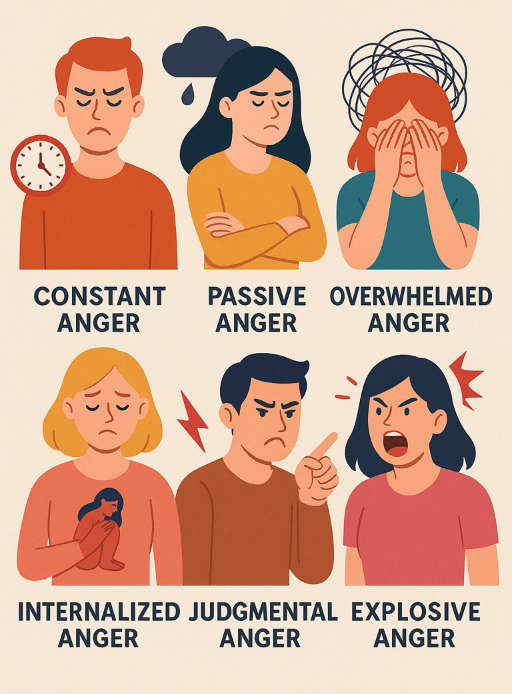How to Control Anger
Anger is part of being human. It’s a normal, even useful emotion, in the right context. Most people feel it now and then, when they’re pushed too far, disrespected, hurt or overwhelmed. And quite often, it passes just as quickly as it arrived.
But for some people, anger feels like it’s always there. Bubbling under the surface, or suddenly erupting in ways that feel out of proportion. And that can be exhausting. Embarrassing, even. Especially if it’s started affecting your relationships, your work life, or how you feel about yourself.
At Purley Oaks Hypnotherapy, we help people gently unpick what’s really going on underneath the anger. Because we’re not born angry. It’s not something you are. It’s something you learned, somewhere along the way. And if it was learned, it can be unlearned. That’s a really important starting point in learning to control anger.

The Function of Anger and When It Becomes a Problem
Most of the time, anger is a reaction to something else: fear, injustice, shame, feeling powerless or cornered. It acts as a sort of signal, alerting the nervous system that something is wrong. The body gets flooded with adrenaline, muscles tighten, heart rate climbs, and everything gears up for fight or flight. That’s biology. It’s not a flaw.
But modern life rarely gives us a clear outlet for that response. You can’t exactly bolt out of a meeting, or scream at a stranger in a traffic jam. So we squash it down, or let it leak out sideways. Sarcastic comments, withdrawing from people, snapping at the wrong moment. And then perhaps feeling guilty afterwards, or confused about where it all came from.
If that sounds familiar, you’re not alone. And you’re not broken. Anger becomes a problem when it’s either too intense, too constant, or turns up in ways that don’t match the situation. That’s when it becomes important to control anger in a way that feels natural and sustainable.
How Anger Can Show Up
Some people lash out physically or verbally, then feel ashamed. Others go quiet, but the internal tension builds up until it explodes. Some direct the anger inward and get stuck in a cycle of self-criticism or guilt. We’ve also worked with people whose anger looks more like anxiety, or complete shutdown. It doesn’t always show up in the ways you’d expect.
It’s not always easy to admit there’s an issue. Especially if anger has become part of how you cope, or protect yourself. But understanding where it started and how it’s being reinforced now can shift everything. That’s one of the first steps when you’re trying to control anger at the root.

We often see different “types” of anger. These aren’t boxes to put people in, but they can help you reflect:
- Constant anger – A simmering, ongoing feeling of frustration or resentment. It can wear down your immune system and lead to burnout, anxiety, or even depression.
- Passive anger – When you avoid direct expression but still feel the intensity. This can damage relationships, often leaving others unsure where they stand.
- Overwhelmed anger – It shows up when life feels too much. Too many pressures, no breathing space, and the result is often snapping over small things.
- Internalised anger – Sometimes the anger gets aimed inwards. You might blame yourself for everything or carry guilt that doesn’t belong to you.
- Judgmental anger = Often linked with resentment. It’s when everything feels unfair, and it’s hard not to get stuck in comparing or criticising.
- Explosive anger – Sudden, intense outbursts that can be frightening to you and others. Sometimes there’s a sense of not being in control of it at all.
These patterns don’t define you. But they can point to areas where healing is needed. And that’s where hypnotherapy can help you begin to control anger without suppressing it.
Our Approach to Help Control Anger
Our approach at Purley Oaks Hypnotherapy is gentle and respectful. We’re not here to label or lecture. We want to understand what’s going on for you. When does the anger happen? What triggers it? What does it feel like in your body? What happens afterwards?
Maybe you’ve noticed you’re more reactive with certain people. Or that it comes out when you feel ignored, disrespected, or powerless. Maybe it shows up more when you’re tired or overwhelmed. Or maybe it’s been there for so long, it just feels like part of who you are. It doesn’t have to stay that way. You can learn to control anger even if it’s been with you for years.
Sometimes the turning point comes from something quite simple. Understanding that you’re not your reactions. That anger is a process that happens in you, not you. When you can create some distance like that, even just a little, it opens the door to change. And that’s a key part of learning to control anger from within.
Working with the Subconscious to Control Anger
Together, we can look at the early experiences that may have shaped your reactions. We can explore beliefs you’ve taken on – things like “I’m not allowed to speak up” or “People always let me down” – and gently reframe them.
Using hypnotherapy, we work with the subconscious patterns that fuel the anger. Rather than trying to suppress it, we want to understand it. Listen to it. Find out what it’s been protecting you from. And then give it permission to step back, because you’ve got new tools now. Better ways to respond.
You don’t have to white-knuckle your way through it. In fact, the more we fight anger, the more it tends to fight back. But when you meet it with curiosity and compassion, something softens.
With practice, you can start to notice the early signs. That subtle tension in your chest, or the way your jaw sets. And instead of following the same old path, you have the space to choose differently. To breathe, to pause, to respond. That’s how you begin to control anger in a calm and lasting way.
When you realise anger isn’t who you are, but something you’ve learned to do, it changes everything. That’s the moment you begin to take your power back.
Simon Everitt
When to Seek Help to Control Anger
Here are a few signs that anger might be something worth looking at:
- You often regret what you’ve said or done in the heat of the moment
- You feel like you’re always on edge, or ready to snap
- Anger has affected your relationships, work, or sense of self-worth
- You feel guilty, ashamed, or confused about your reactions
- You’ve tried to manage it alone, but it keeps coming back
We’re here to help you feel calmer, safer, and more in control. That doesn’t mean never getting angry again. It means understanding your emotions better, so they don’t control you. It means learning how to control anger so that it no longer controls your life.

And that can be transformative. Not just for you, but for the people around you.
If you’re ready to make that shift, we’re here when you are. Get in touch to find out how Purley Oaks Hypnotherapy can help you control anger and feel more like yourself again – calm, grounded, and at ease.

